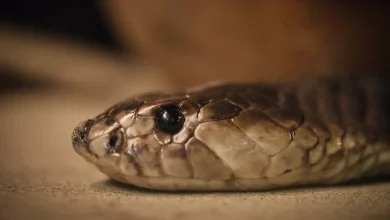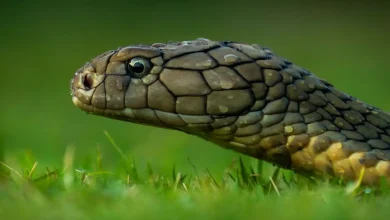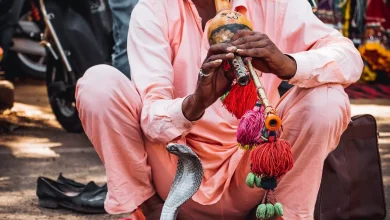Thailand Snake Note – Bitten by Snake?
DO YOU KNOW WHICH SNAKE BIT YOU? IF YES, CLICK ONE:
- Monocled Cobra
- Spitting Cobra
- King Cobra
- Krait
- Pit Viper
- Russel’s Viper
- Coral Snake
- Red-necked or Other Keelback
If you are bitten by a snake in Thailand or anywhere in Southeast Asia:
1. Lay down on the ground and be calm. Many bites – around 50% – are “DRY” bites, meaning, there is no venom transferred during the bite.
2. Find someone to help you get to the hospital immediately – don’t wait for symptoms to begin, and don’t drive yourself.
Emergency Numbers:
- 1155 – Tourist Police – English speaking
- 191 – Thai police nationwide
- 1669 – Ambulance nationwide
- 1646 Bangkok ambulance
3. Stay as still as possible. Tell someone or write down what you can remember about the snake – Color? Thickness? Pattern? Was it in a tree? On ground? Identifying the snake is very important so you get the right antivenin if one is needed.
4. Rinse the snakebite site with water if someone can bring it to you. Don’t get up to get water, stay laying down. Do not touch the bite site, or massage it, rub it, cut it open, or do anything to the site at all.
IF YOU KNOW WHICH SNAKE BIT YOU:
1. If the snake that bit you is a Pit Viper – any green or brown viper, just rinse the area with water and get to the hospital as soon as you can. Pit viper bites can take many hours and even days to become life-threatening. Pit Viper bites may burn and possibly throb at the bite site. Do NOT wrap a Pit Viper bite.
2. If the snake was a Krait, King Cobra, Coral Snake, or Keelback, you can apply an elastic wrap (or strips of any cloth) to the affected arm or leg, starting at the fingers (toes) and working your way up. Go directly over the bite site. The tension in the wrap should be firm, but a finger should be able to go under the wrap.
Snakes of this type have venom that is primarily neurotoxic and affects nerve connections. The venom may act very fast – about 10 minutes, or you may have at least a couple hours before severe effects begin. Wrap the limb and get to a hospital quickly.
3. If the snake was one of the other cobras – Monocled or Spitting Cobras, you should not wrap the bite site unless you are more than 10 minutes away from a major hospital. If you are in a remote location – wrap the bite immediately. Wrap the bite immediately for children.
Some symptoms of envenomation are: vomiting, dizziness, severe headache, weakness, slowing of heart rate and/or breathing. Cobras have venom which is both neurotoxic and necrotoxic, meaning it can severely damage tissue at the bite site – especially when wrapped.
If you begin having any serious symptoms soon after a Cobra bite, immediately apply a snug pressure wrap starting at the foot or hand of the bitten limb and moving up the limb. Get to a hospital immediately – having someone take you in a car, truck, or sitting between two people riding a motorbike. DO NOT DELAY.
IF YOU DO NOT KNOW WHICH SNAKE BIT YOU:
1. If you do NOT KNOW what type of snake it was that bit you, go to the hospital immediately. Do not wait for symptoms to develop. Ideally, you will be at a hospital within 10-15 minutes of the bite, and they can monitor symptoms. If you have severe burning or throbbing at the bite site, do not wrap the bite – it is likely to be a Pit Viper or Cobra bite. HOWEVER, if you have nausea, stomach pain, breathing or speech difficulties, or drooping eyelids, wrap it immediately and go to the hospital fast.
2. At the hospital, antivenin is given AFTER you start to have symptoms, not before. Some bites are “dry bites” and inject no venom.
Caution… antivenin (also called antivenom) can cause severe allergic reaction which sometimes results in anaphylactic shock – a potentially deadly complication. Get good advice on the necessity of antivenin before it is administered. The doctors should do a test to see if you’re allergic to it first before full-scale administration of antivenin. They can also administer the first vial extra slowly and remain prepared for symptoms of shock in case of allergy.
One doctor I know well insists that antivenom should not be given until a syringe of epinephrine is on the table – in case of anaphylactic shock. He has found an approximately 30% instance of bad reaction against the antivenom.
Insist on it!
Here is how the test for sensitivity to antivenin is administered (from Queen Saovabha Memorial Institute, Bangkok): “Since the antivenin is prepared from horse serum, sensitization to heterologous protein may occur in some individuals. To avoid serious allergic reactions, skin test should be performed prior to the administration by injection of 0.02 ml of 1:100 antivenin dilution intradermally. It should be noted that the skin test may not predict the anaphylaxis nor delay serum sickness reactions.”
Do Not:
- Suck the poison out or use any devices to suck out the venom, it can cause more damage to tissue if it is a viper bite.
- Use a tourniquet, electro-shock, or massage
- Use ice over the wound
- Drink alcohol, food, or use aspirin or drugs or medicine of any kind.
- Use herbal remedies – ingested or applied to the bite site.
Sources:
- Toxinology.com (snake search)
- Queen Saovabha Memorial Institute, Thai Red Cross Society,
Bangkok, Thailand (662) 252-0161-4; qsmi@redcross.or.th - Guidelines for the Clinical Management of Snakebite in the South-East Asia Region. WHO publication, 2010.
Information for this article was collected from legitimate sources of emergency information regarding snakebite treatment.
If you want to dispute these steps – please send email to: info@thailandsnakes.com.
Once you identify the snake that bit you – here is some more information by snake name – scientific classification:
- AFPMB – Database of Venomous Animals and Plants (click)
Here is the database listing venomous snakes by country:
- AFPMB Database of Snakes by Country (link is down, site is down)





A friend of mine was recently bitten by a snake in Phuket . At night . On the ground . Went to hospital and was told it was not venemous but would be very painful for 24 hours . Later found out that it was extremely venemous and there was nothing they could do . It seems the call is to keep you calm and you either survive or you don’t . Any idea what sort of snake that would have been ? We are Australian and well used to snakes .
Your friend should go back to the hospital with a lawyer. If the bite isn’t venomous – and didn’t involve extensive laceration and puncturing – then there shouldn’t be much pain at all.
A clue is that the burning at a bite site means envenomation for some snakes – vipers and the cobras.
If the blood and tissue below turns black quickly – within hours – definitely venomous bite and antivenom can be administered. All public hospitals are by law required to have antivenom in stock (and know how to use it).